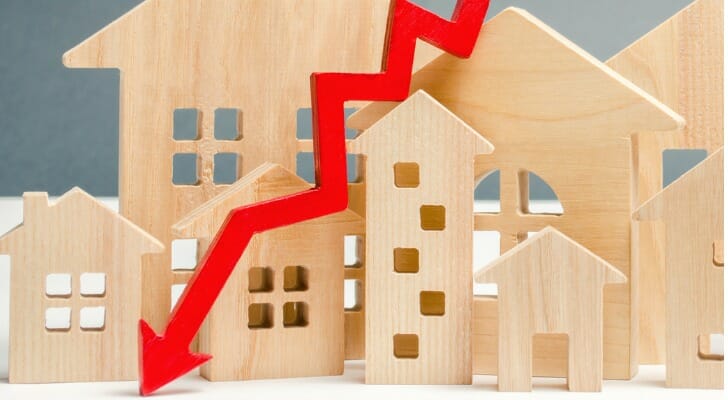A bear market for stocks generally means that prices have declined by more than 20% from their recent highs, as measured by a market index. A bear market can also happen in real estate so it’s important to understand how it occurs. If you apply the same definition as stocks, it can mean a 20% or more drop in property values, which can greatly impact your portfolio. Investing in real estate during a bear market is something that should be approached with intention, which is why it may be a good idea to speak with your financial advisor before moving forward.
Bear Market Definition
A bear market is a market in which stock prices are falling, which encourages selling. Again, this is most often measured as a decline in stock prices of 20% or more, as indicated by a market index or benchmark. Bear markets can be short-lived or they can extend over several months or more. A bear market can give way to a bull market, in which stock prices once again begin to rise.
A bear market can be a precursor to a broader recession, though that isn’t always the case. During a recession, the country’s economic output shrinks and unemployment tends to go up while consumer spending declines. Though they have the potential to be unpleasant financially, recessions are a natural part of the economic cycle.
What Is a Bear Market in Real Estate?
The concept of bear and bull markets is typically applied to the stock market, not the real estate market. But if you’re interested in a definition of a bear market in real estate, it means a significant decline in property values over a period of time. That can apply to both the housing market and to commercial real estate investments such as office space, warehouses and retail centers.
The most notable downturn in the real estate market happened during the financial crisis of the 2000s which lasted from 2007 to 2009. Triggered by a crisis in the subprime mortgage market, housing prices went into a downward spiral that resulted in what has alternately been called a housing collapse or crash. Millions of homeowners ended up underwater, meaning they owed more on their homes than what they were worth, and many lost their homes to foreclosure.
What Causes a Bear Market in Real Estate?

The real estate market and the stock market tend to have a low correlation, meaning what happens in one market doesn’t necessarily affect the other. There are different factors that can lead to a downturn in real estate which resembles a bear market, independent of which way stocks are moving.
For example, in the case of the 2007-09 housing crisis, much of the blame has been laid on unethical lending practices among subprime lenders. Federal regulations enacted following the crisis were designed to prevent a repeat of that situation. But there are other things that could prompt a bear market in real estate, including:
- Lessening demand relative to supply
- Rising mortgage rates
- Economic uncertainty
It should be pointed out that it’s very difficult to predict exactly where the housing market is headed. Understanding the current trends can, however, make it easier to gauge whether a downturn is likely and if so, how mild or severe it might be.
How Does a Real Estate Bear Market Affect Investors?
Bear markets are often viewed negatively because they’re associated with broader economic downturns and in a worst-case scenario, recessions. If you’re a real estate investor or want to become one, a bear market could have an unexpected benefit for you if it creates opportunities. Every sector of the real estate market could actually behave differently depending on what is happening.
For example, say you want to purchase a rental property to create passive income. If housing prices are down because real estate is in a bear market, you could be in a great position to bargain shop for properties. Even when the economy falls into a recession, people still need housing which could enable you to collect a steady flow of rental income.
Commercial real estate may react differently to downturns, especially if a bear market in real estate reflects a larger downturn in the economy. In that scenario, something like office space might not be as profitable if companies are back on expenditures and shrinking their physical footprints in order to save money.
Retail space, on the other hand, could still be a good bet if you’re investing in properties that are anchored by a grocery store. Even when times are tight economically, people still need basic food and household items. Investing in a real estate investment trust (REIT) or real estate fund that holds properties representative of those kinds of consumer staples could act as a hedge against the worst impacts of a bear market.
How to Invest in Real Estate During a Bear Market
Investing in real estate in a bear market isn’t that different from investing in property at any other time. There’s a certain amount of analysis and research that you need to do beforehand in order to fully understand what you’re investing in.
Going back to the rental property example, you’d want to consider things like:
- Location: Where the property is located and the overall temperature of the housing market in that area.
- Vacancy Rates: Vacancy rates for the area are important to calculate your income potential.
- Taxes: Property taxes and how they’re trending up or down over time.
- Geography: Neighborhood conditions and factors that might attract renters (i.e., low crime, good schools, convenient access to shopping and amenities, etc.).
- Job Market: The stability of the job market and where it might be headed.
- Development Plans: Future plans for development and what might impact your investment.
- Rental History: Average rental prices and how they’re trending up or down over time.
It’s also helpful to consider potential risk factors. Buying a rental property in a beach town that’s steadily growing might seem like a great idea if you can rent it out for a tidy profit during the busy tourist season. But if that area is prone to hurricanes or flooding, you might find yourself paying much more for property insurance or worse, having to repair storm-related damages.
Additionally, for commercial properties, the most important thing to consider is net operating income (NOI). A property’s NOI is the difference between gross operating income and gross operating expenses. That can tell you how much you’re likely to see in cash flow and profit from the investment. You can also consider the overall temperature of the market in relation to the wider economy.
The Bottom Line

The most important thing to keep in mind in a real estate bear market is that not all sectors react the same way. For instance, the housing market may recover more quickly than commercial properties, depending on what’s driving the downturn. Diversifying your real estate investments and your broader portfolio as a whole can help to build in some protection against bear market dips.
Tips for Investing
- Consider talking to your financial advisor about how bear markets could affect your real estate holdings and how to invest in real estate effectively during a downturn. If you don’t have a financial advisor yet, finding one doesn’t have to be difficult. SmartAsset’s free tool makes it easy to connect with professional financial advisors in your local area. It takes just a few minutes to get your personalized advisor recommendations online, get started now.
- Real estate investment trusts and real estate crowdfunding can offer the benefits of property investing without having to own anything directly. You can also invest in real estate mutual funds or exchange-traded funds if you’d rather not deal with tenants. When comparing different real estate investment options, consider the risk/return profile, costs and the holding period to see how they align with your goals.
©iStock.com/ArLawKa AungTun, ©iStock.com/Andrii Yalanskyi, ©iStock.com/Pattanaphong Khuankaew
